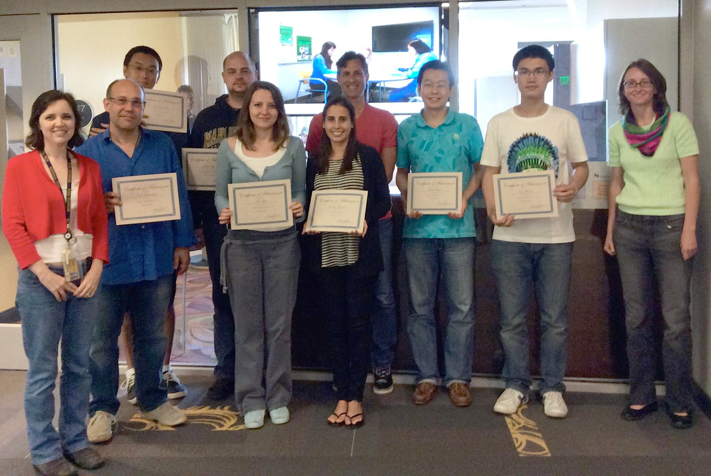In early June, Georgia Tech’s Communication Center and the Stewart School of Industrial & Systems Engineering (ISyE) collaborated on a pilot Dissertation Writing Boot Camp (DWB), a week-long series of intense writing sessions designed to provide students with time, space, and resources to make significant progress on their dissertations.
“As someone who had great difficulty developing a disciplined writing schedule with my own dissertation,” said Clint Stivers, a Brittain Fellow and Communication Center professional tutor, “I wish I'd been able to attend a DWB. Our pilot with the ISyE students demonstrated how establishing such a schedule is fundamental to successful writing.”
Since the University of Pennsylvania’s first Dissertation Boot Camp in 2005, universities across the country have been experimenting with the model, trying to find ways to provide assistance to graduate students, many of whom find the task of finishing their dissertations formidable.
“Real life gets in the way,” says Brandy Ball Blake, ISyE communication specialist. “Graduate students have to teach, grade, research, support their families, spend time with their families—somehow manage to be ‘whole’ human beings and finish their dissertations in a prescribed amount of time. The Boot Camp provides these students with a supportive environment and a set time and place to focus on their work and not be pulled in a thousand directions.”
Students from the ISyE and from Literature, Media, and Communication worked on their dissertations in the Communication Center from 9 am to 5 pm every day, taking occasional scheduled breaks to eat, get the blood flowing, and re-energize.
In addition to maintaining a strict schedule, the participants were asked to identify daily goals and to track how successful they were at keeping those goals.
“Our intent was to keep everything positive,” explained Blake. “The students set their own pace, but accountability was the key. They were accountable to the goals they set and, because of the close-knit environment, to everyone else who was diligently working in the room. This really kept them focused.”
Student feedback indicated the overwhelming success of the pilot--helping the participants make significant progress towards their long-term writing goals, analyze and assess their writing goals, stay focused on their projects, and identify barriers to writing productively. Just as significantly, the week helped them realize the importance of rewarding themselves for their efforts.
“An important goal for Boot Camp programs is to help students develop long-term positive writing strategies through behavior changes,” says Karen Head, assistant professor and director of the Communication Center. “We stressed the importance of rewards because feeling even a small sense of accomplishment makes it more likely that writers will continue practicing their new strategies.”
How did they hold up during the Boot Camp? “They were energized,” says Blake. “Seeing tangible progress towards their goals seemed to inspire them. We thought they would want to go home early on Friday, but many of them said they would stay even later if we let them.”
Where does the Boot Camp go from here? “Based on the success of this pilot study,” says Stivers, “I anticipate the Dissertation Writing Boot Camp will become an opportunity for graduate students in all departments who are trying to write their dissertations.”
